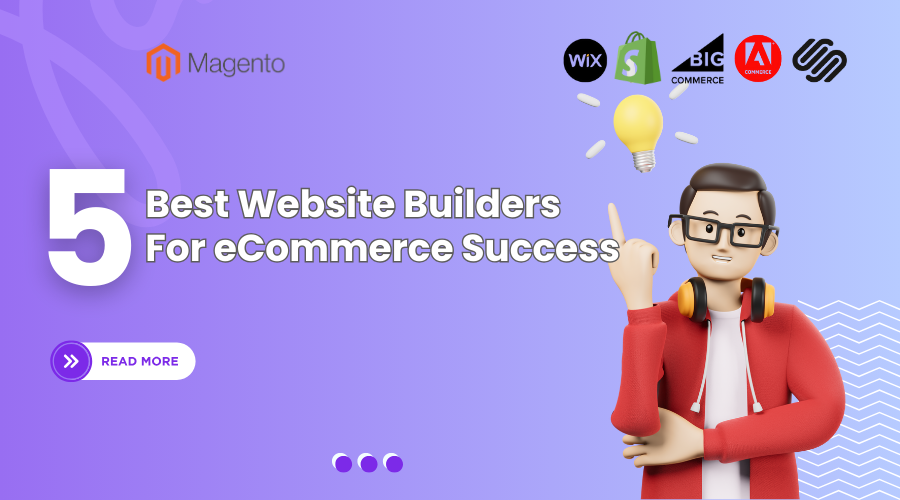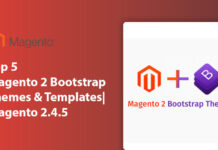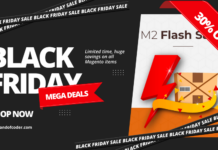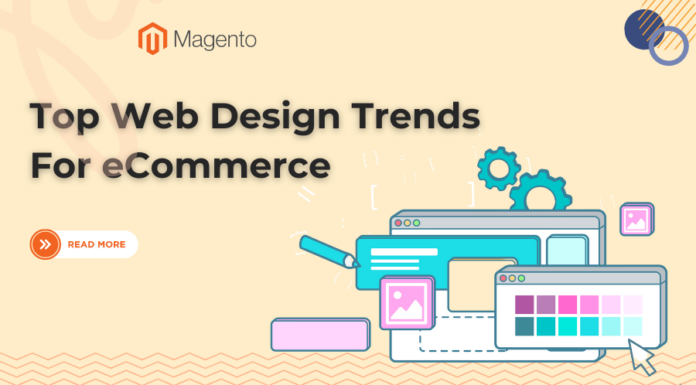
Gone are the days when business owners needed to have the technical know-how to set up a fully functional ecommerce store. With the right ecommerce website builder, you can avoid any hassle and get your store up and running in no time.
However, given the huge number of website builders available on the market today, choosing the right one can be daunting. That’s why I’ve made the process easier for you by shortlisting the best website builders for ecommerce businesses in 2024.
So, let’s get into it.
Table of Contents
5 best website builders for eCommerce success
Whether you’re a budding entrepreneur or an established merchant, these 5 top-notch website builders will help expand your online presence and boost your business profits.
1. Adobe Commerce

If you’re rapidly scaling up, have tons of products, or are expanding your market, then Adobe Commerce could be precisely what you’re searching for.
Formerly Magento Commerce, Adobe Commerce is a popular open-source ecommerce platform suitable for various types of businesses.
Particularly ideal for mid and large businesses with multiple brands, Adobe Commerce offers scalable and flexible digital solutions to create a one-of-a-kind online storefront.
Fortunately, the platform still operates on a free-to-install open-source model that caters to small businesses just starting out.
This makes Adobe Commerce a great website builder for anyone looking to start an ecommerce business of any size.
Whether you have 10 products or 100,000, the website builder can help expand your online presence and grow your brand.
However, it’s important to note that Adobe Commerce doesn’t have any business tax filing capabilities.
Nonetheless, you can leverage some tax software extensions to help you best manage your sales tax rate.
Key Features:
- Is flexible and has great customization capabilities to cater to varying business needs
- Users can manage several stores and ecommerce sites from one dashboard
- Offers numerous third-party extensions that offer thousands of features, from SEO optimization to promotions
Pros:
- Can support 500,000+ products on a single server
- Has a mobile-friendly interface that makes it easy to operate from smartphones
- Supports multiple currencies worldwide, including the US Dollar, Euro, and Hong Kong Dollar
Cons:
- Magento’s architecture requires time and expertise to master
Pricing
Unlike other website builders, Adobe Commerce doesn’t have a fixed monthly price model. The platform is free to download and use. However, depending on your store’s needs, you may have to purchase different extensions, themes, and plugins. Landofcoder offers premium Magento extensions with robust features that can help online businesses enhance sales and boost their marketing reputation.
2. Shopify

With over 500,000 online stores in the apparel category alone, Shopify is one of the most popular website builders for ecommerce businesses. Among the notable features is the drag-and-drop functionality, which allows users to design and launch an online store without any prior knowledge of coding.
Users can also launch ad campaigns using Facebook Ads, Google Smart Shopping, and email marketing tools, among many others. These tools collectively help businesses to improve their online visibility, target a specific audience, and dramatically increase their ecommerce sales.
Key Features
- Has a simple and user-friendly interface
- Has extensive security features like encryption and fraud protection for maximum safety
- Offers more than 100 professional themes
Pros:
- Supports multiple currencies worldwide
- Suitable for small startups and large corporations alike
Cons:
- There’s a transaction fee of 2.4% to 2.6% on each sale
- Moving an existing store to another platform can be difficult and time-consuming
Pricing
Check out the monthly prices of Shopify’s pricing plans below:
- Basic: $32
- Shopify: $92
- Advanced Shopify: $399
Pro Tip: You should create your ecommerce store that boosts your user experience. Integrate tools such as help desk ticketing solutions, live chats to provide instant customer support to your customers. It helps you grow your ecommerce business.
3. Wix

With more than 250 million users worldwide, Wix stands out as a prominent name in website development thanks to its intuitive interface and ease of use. You can build an ecommerce website for free using this versatile drag-and-drop website builder.
However, to sell any product or add other ecommerce features, you’ll need to upgrade to a paid plan. Wix alternatives are also good options that can also help you build an ecommerce website with your requirements. Attrock curated a list of the best Wix alternatives that can help you to choose the right one.
Key Features
- Offers 800+ mobile-friendly and customizable templates
- Includes built-in SEO tools that can help rank your site on Google in no time
- Has a user-friendly interface for easy site management
Pros:
- Provides great customer support to users in 10+ languages
- Has no limitations on the number of products you can sell
Cons:
- You can’t switch templates once you launch your site, which may hinder your ability to scale your business over time
- Websites are not transferable, hence you’ll need to build a new website if you decide to change platforms
Pricing:
Here are the various plans it offers and their prices, when billed monthly:
- Connect Domain: $4.50
- Combo: $8.50
- Unlimited: $12.50
- VIP: $24.50
4. BigCommerce

BigCommerce is a great website builder that’s ideal for large ecommerce businesses. Its integration with popular online sales channels like Amazon, eBay, and Facebook makes it a great choice for businesses selling on social media platforms and online marketplaces. It also integrates with multiple accounting software to offer seamless startup accounting and bookkeeping.
Key Features
- Supports 60+ payment solutions, including Apple Pay, PayPal, and Stripe
- Offers several ecommerce marketing tools to expand your online presence
- Offers headless commerce and omnichannel ecommerce solutions
Pros:
- Allows you to sell internationally through multiple sales channelsDoes not charge any transaction fee
Cons:
- Because of its multiple features, users may take a while to get used to the platform’s interface
Pricing
Check out the monthly prices of BigCommerce’s pricing plans below:
- Standard: $39
- Plus: $105
- Pro: $399
- Enterprise: Custom
Pro Tip: Provide right information with your customer so that they feel connected with you. You can outsource data mining services to get real time data and use them to grow your sales and revenue with good customer service.
5. Squarespace

Primarily known for its aesthetically pleasing designs, Squarespace is a versatile website builder that provides industry-standard ecommerce solutions. It’s one of the best ecommerce tools that offer drag-and-drop store builder, allowing users to create a sleek, professional site that aligns with their brand.
Key Features
- Has a logo maker that allows users to create a logo for their ecommerce store easily
- Includes several contactless marketing tools and features to help you market your brand
- You can schedule products and promotions for specific dates
Pros:
- Has a mobile app that allows users to edit their store on their mobile phones
- Users can sell an unlimited number of products once they upgrade to a paid plan
Cons:
- It doesn’t offer autosave or backup options, and deleted content can be difficult to recover
Pricing
Checkout Squarespace’s pricing plans with monthly prices listed below:
- Personal: $23
- Business: $33
- Basic Commerce: $36
- Advanced Commerce: $65
To wrap thing up: Start your eCommerce store with the best website builder this year
The right website builder is certainly a game-changer for online businesses. By embracing its impressive features, you can create an ecommerce store that fosters growth, stands out, and engages customers. So choose wisely and pave the way for your business’s success in 2024.
Author Bio
 | Reena Aggarwal is Director of Operations and Sales at Attrock, a result-driven digital marketing company. With 10+ years of sales and operations experience in the field of e-commerce and digital marketing, she is quite an industry expert. She is a people person and considers the human resources as the most valuable asset of a company. In her free time, you would find her spending quality time with her brilliant, almost teenage daughter and watching her grow in this digital, fast-paced era. |
- Gravatar Email ID: [email protected]
- Social connects: LinkedIn, Twitter











![[SALE OFF] Discount 30% All Premium Extensions On Christmas And New Year 2025 christmas-and-new-year-2025](https://landofcoder.b-cdn.net/wp-content/uploads/2024/12/christmas-and-new-year-2025-1-218x150.png)






